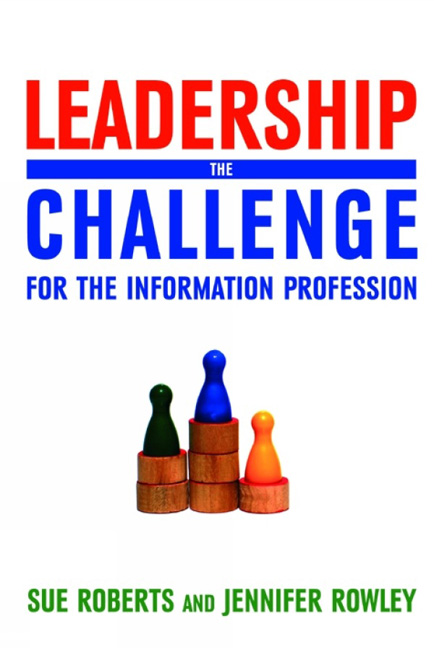8 - Influential leadership
Published online by Cambridge University Press: 08 June 2018
Summary
Learning objectives
After reading this chapter you should be able to:
☑understand the information professional's value beyond the library context
☑appreciate approaches and issues related to working with politics and power
☑reflect on the influence of library and information professionals within wider contexts
☑consider two specific case studies that illustrate influential leadership
☑consider the importance of developing a ‘leading organization’ as well as leading individuals.
Introduction
Chapter 8 explores the role of the information professional in leading and influencing in contexts beyond the library, where the other stakeholders are not information professionals. We feel this is of particular importance in today's organizations where libraries and library and information professionals are often working – and indeed are expected to work – beyond traditional boundaries and in doing so can provide added value. This blurring of boundaries brings multiple opportunities for wider influence and greater impact, but clearly requires a high level of influential leadership. This involves understanding and capitalizing on the leadership, management and information competences that working in an information service or information industry environment develops. This chapter thus begins with a discussion of the value of the information professional beyond the library context and explores specific examples of leadership and influence. We then focus on issues related to working with politics and power, and leadership approaches to them. This final chapter is different from the others in the book as it provides two detailed case studies to illustrate leadership and influence where library and information professionals have made significant impact both within and beyond organizations. These examples are drawn from real life experiences from different sectors – health and higher education. They also provide insights into the individuals who influenced within these contexts. Consequently, the chapter does not include a case cameo interview. We conclude with reflecting on the relationship between developing influential leadership at an individual level and developing leading organizations.
Leadership and influence
The theme of influential leadership has pervaded this book. Leaders at all levels use their influence to lead and motivate people, to implement change, to lead teams and to shape values and culture. We have provided diverse examples of this influence in practice throughout each chapter. Many authors write about ‘influencing skills’ and suggest that we can simply learn these skills in order to manage and lead people effectively.
- Type
- Chapter
- Information
- LeadershipThe challenge for the information profession, pp. 209 - 230Publisher: FacetPrint publication year: 2008

